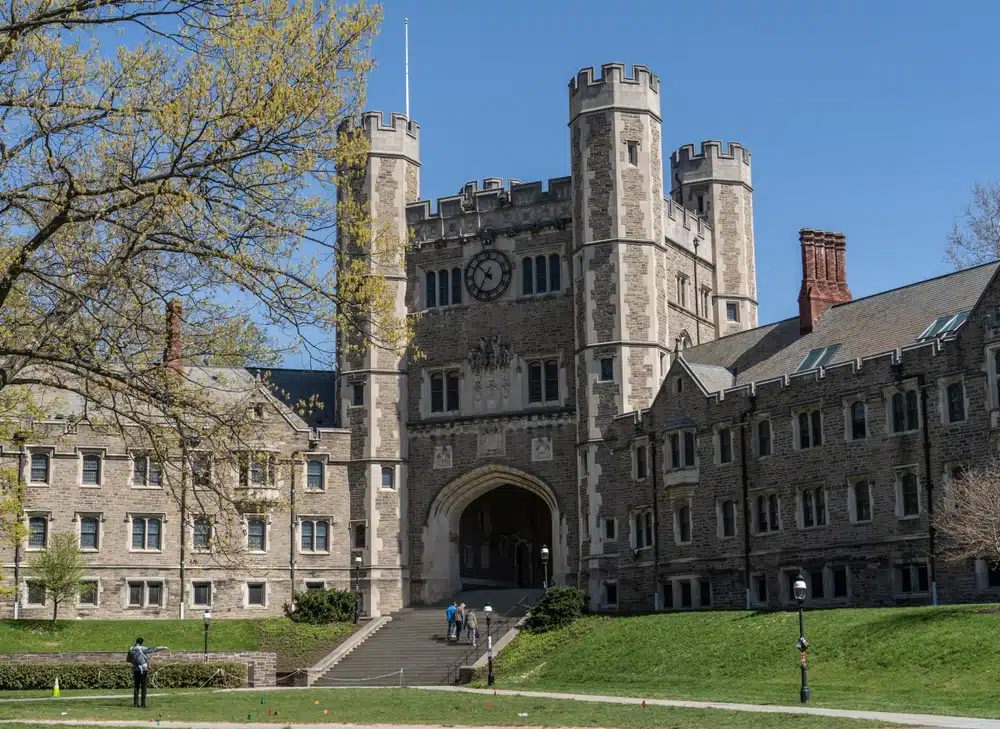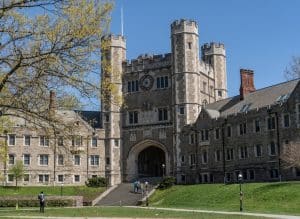Princeton doesn’t require every applicant to go through an alumni interview. However, with their large alumni network, they have plenty of interviewers spread out across many cities and regions. With a very low acceptance rate of 4.62%, every part of your application counts—including the optional interview. This conversation allows you to make a memorable impression beyond your grades and essays. Princeton interview questions usually focus on getting to know you better, such as your interests, goals, and reasons for choosing Princeton, and helping the admissions team see the person behind the application.
In this blog, we walk you through helpful tips on how to prepare for a Princeton interview with sample questions and a full guide on how to answer them.
- Does Princeton Conduct Interviews?
- Common Interview Questions at Princeton
- How Does the Alumni Interview Work?
- Helpful Princeton Interview Tips
- What to Ask Your Interviewer
- Frequently Asked Questions
- Takeaways
Does Princeton Conduct Interviews?
Yes, Princeton does. Once your application is submitted, Princeton gives you the option to have an alumni interview. If you’d rather not participate, you can simply opt out of the Princeton Supplement, and it won’t impact your application at all.
These interviews are casual, around 30-45 minutes, and give you a chance to chat with a Princeton alum about your interests and ask any questions you might have. Not everyone will get an interview, though, as it depends on alumni availability in your area, and all interviews are held off-campus.
Common Interview Questions at Princeton
Getting ready for your Princeton interview might feel a little intimidating, but keep in mind—it’s really just a conversation, not an interrogation. Your interviewer simply wants to learn more about who you are, your interests, and what drives you. To help you go in feeling prepared, here are some of the most common Princeton interview questions, along with tips on how to answer them in a way that feels natural and authentic. Just relax, be yourself, and use this chance to show why you’re a great fit for Princeton!
1. Why Princeton?
This maybe the most common among all Princeton interview questions. The key to nailing this question is to get specific about what makes Princeton a great match for you—and vice versa. Show that you’ve really thought about why this school and program align with what you’re looking for. Think about Princeton’s values, the unique way they approach education, or a specific opportunity they offer that fits perfectly with your goals.
Try to steer clear of mentioning Princeton’s prestige, rankings, or Ivy League status. While those things might be appealing, your interviewer wants to know that you’re genuinely drawn to Princeton for reasons beyond just its reputation.
“I’m drawn to Princeton because of its strong focus on independent work and the chance to collaborate closely with faculty. I love that students here are encouraged to pursue their own ideas and explore topics in depth, which aligns perfectly with my goal to study environmental policy and make a real impact. Princeton’s unique junior papers and senior thesis projects would give me the tools to dive into complex issues that matter to me. Plus, I appreciate Princeton’s emphasis on service and community, which resonates with my values and desire to contribute beyond academics.”
2. What activity are you most passionate about being involved in?
When answering this question, focus on an activity that genuinely excites you and has made a meaningful impact on you. Share why it’s your favorite—maybe it’s because of the skills you’ve learned, the connections you’ve built, or the way it challenges you. Reviewing some Princeton interview questions can help you think through ways to express this authentically. Try to give specific examples of what you love about it and how it’s shaped you.
Avoid choosing an activity just because it “looks good” on an application. Interviewers can usually tell if you’re not genuinely passionate. Instead, focus on something that really reflects who you are and what matters to you.
“My favorite activity has to be volunteering at the community garden. I love working alongside people from all different backgrounds, learning about gardening, and seeing the results of our hard work come to life. It’s taught me a lot about patience and teamwork, and there’s something really satisfying about knowing the fresh produce we grow helps support local families. This experience has given me a sense of purpose and a way to make a small difference in my community.”
3. What’s your favorite class, and which class would you secretly be okay with having a substitute teacher for the rest of the year?
When answering this question, talk about your favorite class with some enthusiasm. This is one of the Princeton interview questions where you can share what you enjoy about it—maybe it’s the subject, the projects, or even the way your teacher brings it to life. This will show your genuine interest and what subjects really spark your curiosity.
For the class you’d be okay having a substitute in, you can be honest, but keep it light-hearted. Mention why it’s not your favorite—maybe the topic just doesn’t click with you or it’s challenging in a way that’s tough to enjoy. Just be sure to stay positive and avoid sounding overly negative about the teacher or subject.
“My favorite class has to be English—I love diving into different stories and getting to discuss big ideas with my classmates. Our teacher really makes it interesting, and I feel like I learn something new every day. On the other hand, I wouldn’t mind a substitute in physics. It’s not that I don’t try, but the concepts just don’t come as easily to me. Still, I know it’s important, so I do my best to keep up!”
4. What are you reading right now just for fun?
When answering this question, pick a book that genuinely interests you and share a little about why you chose it. This is one of the Princeton interview questions where you don’t need to go into too much detail but mention what you’re enjoying about it or what drew you to it—whether it’s the story, the topic, or just a fun escape.
Try to avoid picking something just because it seems impressive. Interviewers are more interested in your authentic interests and what you’re curious about. Let your enthusiasm show, even if it’s a light read; it says a lot about who you are and what you enjoy outside of academics.
“I recently finished The Alchemist by Paulo Coelho. I picked it up because I’d heard a lot about it, and I loved how it’s all about following your dreams and learning from the journey. It was a nice break from school reading, and it really got me thinking about my own goals in a different way.”
5. What has been your proudest moment in high school?
This is one of the Princeton interview questions where you can think about a moment that genuinely made you feel proud and reflects something meaningful to you. It could be an academic achievement, something from an extracurricular, or even a personal challenge you overcame. Try to highlight what that moment taught you or how it made you feel—it gives insight into what matters to you and shows your personal growth.
Avoid choosing a moment just because it sounds impressive. Instead, focus on a story that feels true to who you are, even if it’s something small. This will make your answer feel authentic and relatable.
“My proudest moment in high school was when I led our team’s fundraiser for a local shelter. We set a big goal, and honestly, I wasn’t sure we’d reach it. But after organizing events and rallying support, we ended up exceeding our target. Seeing how everyone came together for a cause we cared about felt amazing, and it taught me the impact we can make when we put in the effort.”
6. What was the reason behind your choice of major?
When answering this question, focus on what genuinely sparked your interest in your chosen major. Think about what experiences, subjects, or passions led you to it. This is one of the Princeton interview questions where you can explain why it excites you and how it connects to your goals or interests—it helps show that you’ve put thought into your choice and have a sense of direction.
Try to avoid choosing reasons that sound generic, like simply for job prospects or because it’s a popular field. Instead, share your unique story or a specific moment that inspired you. This gives your answer a personal touch and shows why this major truly fits you.
“I chose psychology because I’ve always been fascinated by how people think and what drives their actions. After volunteering at a local youth center, I realized how much I want to understand more about mental health and ways to support others. Studying psychology feels like the right path because it combines my curiosity with my goal of making a positive impact.”
How Does the Alumni Interview Work?
Princeton offers optional alumni interviews after your application is submitted. If you’d rather not participate, you can simply opt out of the Princeton Supplement, and this won’t impact your application in any way. If you’re open to it, you might get an email inviting you to chat with a Princeton alum from the Alumni Schools Committee. We encourage you to go for it if you’re interested!
These 30- to 45-minute conversations are informal, giving you a chance to talk about what matters to you and ask questions to someone who’s been through Princeton. Reviewing common Princeton interview questions beforehand can help you feel more prepared and confident for this conversation.
While we can’t guarantee everyone an interview, as it depends on alumni availability in your area, most applicants are able to connect with someone. If you don’t receive an interview, don’t worry—it won’t affect your application. Note that all interviews are off-campus and should not be recorded by either party.
Who is eligible?
All Princeton applicants are eligible for an optional alumni interview. After submitting your application, you may be contacted for an interview based on the availability of alumni in your area. If you do not wish to participate, you can opt out through the Princeton Supplement, and it won’t impact your application.
When is the interview?
Princeton’s optional alumni interviews are typically scheduled after the Admission Office has received your application. Reviewing common Princeton interview questions beforehand can help you feel more prepared if you’re invited to participate. The timing of this invitation depends on the availability of alumni interviewers in your area. While the university strives to offer interviews to as many applicants as possible, not all applicants will receive an interview due to logistical constraints.
Where is the interview?
Princeton’s optional alumni interviews are typically conducted off-campus, either in person or virtually, depending on the availability of alumni in your area. In-person interviews often take place at local venues like coffee shops or libraries. If an in-person meeting isn’t feasible, interviews may be conducted via phone or video chat.
What happens after the interview?
Feel free to send a thank-you email to your alumni interviewer after your chat! Reviewing common Princeton interview questions beforehand can help you feel prepared and make the most of your conversation. After the Princeton alumni interview, your interviewer will submit a report to the Admissions Office, providing insights about your conversation. This report highlights your interests, strengths, and how you might fit within the Princeton community.
The Admissions Committee will consider the interview report along with the rest of your application, but remember, since the interview is optional, not having one won’t disadvantage you in any way.
Helpful Princeton Interview Tips
As you get ready for your Princeton interview, it’s helpful to keep a few tips in mind beyond just practicing potential Princeton interview questions. Here are some pointers to help you feel prepared for your conversation with an alumni volunteer:
- Do your research. Take some time to learn about Princeton’s programs, culture, and what makes the school stand out. When asked, “Why Princeton?” it’s great to have specific reasons that go beyond general enthusiasm.
- Be yourself. This interview is all about Princeton getting to know the real you, so just relax and let your personality come through. Don’t try to be what you think they want—stay genuine and share your true interests and passions.
- Review common questions. While you won’t know the exact questions in advance, having answers ready for typical Princeton interview questions like “What are you passionate about?” or “Tell me about a challenge you’ve overcome” can help you feel more at ease.
- Showcase your curiosity. Princeton values students who are curious and motivated, so talk about what excites you both academically and personally. Whether it’s a specific field or an extracurricular, let them see what drives you.
- Ask thoughtful questions. The interview is a two-way street. Prepare a few questions about Princeton or the alum’s experience there to show that you’re genuinely interested and eager to learn more.
- Stay calm and collected. Interviews can be nerve-wracking, but remember—it’s just a conversation. Take a deep breath and don’t be afraid to pause to think about your answers. It’s okay to take your time!
Lastly, make sure all the logistics are set—whether you’re meeting in person or online- and have everything ready to go. Good luck—you’ve got this!
What to Ask Your Interviewer
Remember, interviews go both ways! While your alumni interviewer will ask you questions, you’ll also have the chance to ask them a few during your Princeton interview. This is a great way to show you’re genuinely interested in learning more about the university. Along with preparing for Princeton interview questions, think about some questions to ask your interviewer to make the conversation more engaging and meaningful.
Not sure where to start? Here are a few ideas:
1. What drew you to Princeton?
This question helps you understand why your interviewer chose Princeton and might reveal some unique aspects or opportunities you hadn’t considered. Plus, it gives you a chance to hear what makes the school special from their perspective.
2. What do you remember most about your time at Princeton?
College life is about more than academics. Asking this gives you insight into the experiences that left a lasting impact on your interviewer, helping you picture what your own Princeton journey could be like.
3. What did you major in, and how has it helped you in your career?
This is a great way to connect your academic interests to future career paths. Hearing how your interviewer went from student life to their profession can give you valuable insight into how Princeton prepares its students for the real world.
These questions will not only help you learn more about Princeton but also show your interviewer that you’re thoughtful, curious, and genuinely invested in your future!
Frequently Asked Questions
1. How many Princeton interview questions are typically asked?
In a Princeton alumni interview, you can typically expect around 5 to 10 questions. These questions often cover a range of topics, like your interests, academic goals, extracurricular activities, and why you’re interested in Princeton. The interview is designed to be more of a conversation, so the exact number can vary depending on how in-depth the discussion goes and how much you share in your responses.
2. How much do Princeton interviews matter?
Princeton interviews are an optional, minor part of the application process. They give you a chance to share more about yourself, but they don’t significantly impact admissions decisions. Admissions officers mainly focus on your academics, extracurriculars, essays, and recommendations. A good interview can add a personal touch, but it won’t make or break your application.
3. Should I opt for an interview with a Princeton alum?
Yes, if you’re comfortable with it, opting for an interview with a Princeton alum can be a great choice! It’s a chance to have a relaxed, one-on-one conversation where you can share more about yourself and ask questions about Princeton from someone who’s experienced it firsthand. While the interview won’t significantly impact your admission decision, it can provide a personal dimension to your application and help you get a better feel for the school.
Takeaways
Princeton’s alumni interview can add a meaningful dimension to the application process by allowing you to showcase their personalities, interests, and commitment to Princeton’s values.
- While Princeton’s alumni interviews are optional, they offer a unique way to express who you are beyond the written application.
- This conversation with an alum can help the admissions team gain a fuller understanding of your character, goals, and values, potentially enhancing your application’s personal touch.
- When answering the popular “Why Princeton?” question, it’s crucial to express specific reasons for wanting to attend, such as Princeton’s educational philosophy, faculty, or unique programs.
- The alumni interview is an opportunity to ask thoughtful questions about Princeton. Asking your interviewer about their experiences or what drew them to Princeton demonstrates genuine interest and helps build a meaningful connection.
- Beyond preparing for common Princeton interview questions, you can get assistance for the entire application process when you partner with a college admissions consultant.











































